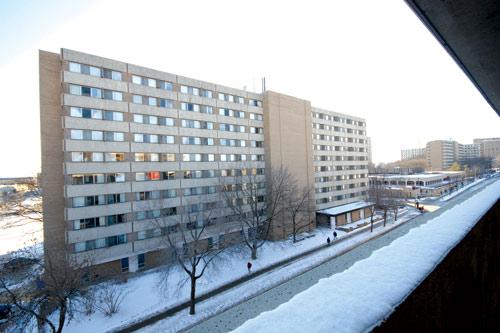Students living in dorms are finding ways to keep themselves entertained during the COVID-19 pandemic.
Freshman Ndubuisi Osuji wasn’t planning on returning home to Nigeria until the summer, so when the University of Wisconsin canceled face-to-face instruction because of the COVID-19 pandemic, he signed up to stay in the dorms — one of the few to do so.
According to University Housing Communications Director Brandon Dybdahl, only around 600 students still live in UW’s residential halls. Students chose to stay in the dorms for a variety of reasons, Dybdahl said.
UW opens Dejope Residence Hall to provide temporary housing for healthcare workers
Dybdahl said many students who stayed were international students, unable to return home because of travel restrictions or expensive plane tickets. Some, Dybdahl said, stayed for online classes because their homes didn’t have internet.
Others, like house fellow Arthur Willis, stayed because going home was simply too inconvenient.
“At first my dad was trying to nudge me into coming back,” Willis said. “My family would probably prefer me at home, but at this point I don’t think that’s an option.”
Both Osuji and Willis live in Ogg residential hall. Only Ogg, Chadbourne, Smith and Barnard residential halls are still open — the others being emptied to make room for future purposes, Dybdahl said. Though University Housing hasn’t been officially asked, Dybdahl said the empty dorms may be needed to support health care staff and hospital overflow. UW Housing recently opened up Dejope Residence Hall to health care workers who didn’t want to risk unknowingly spreading COVID-19 to their families, according to The Badger Herald article.
So far no residents contracted COVID-19, but if any do, University Housing will make room for them to self-quarantine, Dybdahl said. In the meantime, the University Housing staff is encouraging the residents to wash their hands and social distance. But despite the pandemic, both Willis and Osuji said they weren’t afraid for themselves.
“For me, I’m not concerned with the whole pandemic,” Osuji said. “[But in Nigeria] you see some people who only eat what they made that day— it’s not like they have money to feed themselves. It’s going to affect a lot of people. I hope it doesn’t.”
If Willis and Osuji do leave their dorms, there are few places to go. According to UW’s website on COVID-19, all libraries, gyms and unions are closed. The UW Housing website states the only open dining hall is Gordons, but only for take-out during certain hours.
Additionally, traditional University Housing services — like planning and holding floor events — are indefinitely canceled, Dybdahl said. For Willis, the lack of traditional duties only makes his day more monotonous.
“It’s kinda sad,” Willis said. “They made me turn in my extra keys. I didn’t watch Netflix at all before this started. Now I watch a decent amount of shows. I watch a couple lectures a day. I’m just online a lot.”
Dybdahl said UHS mental health services are being offered to any student who needs it. According to the UHS website, students may still call to make mental health appointments and the appointments are remote.
UPDATED: UW System to provide student housing residents with refund
Osuji said loneliness is not a problem. In fact, he said he likes the extra time.
“Before, I didn’t really have time to cook, but now I basically own the kitchen,” Osuji said. “I can have flexibility, I can just chill in my room, do my exercises and when I’m done I can watch my Netflix.”
Osuji said he also prefers having some classes online. Osuji said, for difficult subjects, being able to pause the lecture gives him time to understand the professor’s point.
UW suspends all spring semester face-to-face course instruction
Willis said one upside of the pandemic was having more time to relax. He said he’s spent a lot of his free time FaceTiming family, and watching videos on how to produce beats. Willis said he cooks more.
Despite enjoying his free time, Osuji said he misses Nigeria. He said he misses his friends and house, and, if all goes well, he will return in the summer. If not, Osuji said he will stay with his uncle in Texas.
“I miss everything,” Osuji said. “You can’t really compare anything to your house.”
Dybdahl said University Housing still hasn’t decided whether they will keep the dorms open in the summer. Usually, Dybdahl said, youth camps and conference groups use the dorms, but this summer, University Housing might need to house international students who can’t get home.
For Willis, it wouldn’t be the strangest thing to happen this year. He said he still gets thrown off when he walks around the deserted campus.
“This whole semester feels like it didn’t happen,” Willis said.













